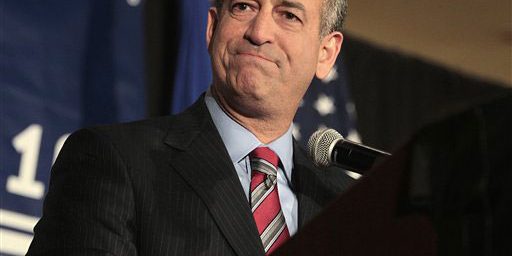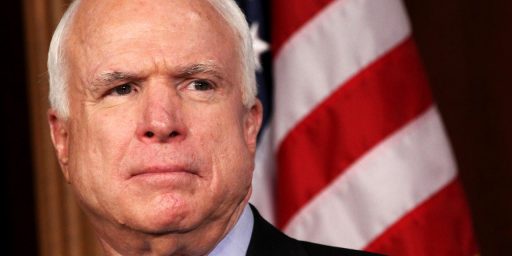Failure of McCain-Feingold
Mark Tapscott observes that the recent disclosures of record-setting fundraising hauls by the presidential candidates demonstrates that McCain-Feingold has been a miserable failure in curtailing the “getting rid of the corrupting influence of money on politics.” Worse, it has “open[ed] the door for Congress to decide what is acceptable political speech.”
For the first time in American history, individual citizens cannot join with like-minded others as members of a variety of associations to buy a broadcast spot to criticize an incumbent congressman by name for 60 days prior to the November election. In other words, this terrible law has unleashed the most corrupting influence of all in giving career politicians the power of government to silence their critics. McCain-Feingold must be repealed.
The good news is that John McCain came in behind not only Rudy Giuliani but Mitt Romney, who is within the margin of error of trailing me in the polls.






You may be within the margin of error on the polls, but McCain did turn in a better Q1 fund raising report than you (even if it was better than anyone else in the top tier for either party).
We should just move to a system of publically financed elections and eliminate the problem altogether. Combine that with making lobbying the crime it is (i.e. bribery) and this country might have a decent shot at a working democracy.
We should just move to a system of publically financed elections and eliminate the problem altogether.
It wouldn’t actually eliminate the problem, since outside groups would still have an interest in advocating on behalf of their candidates, but it would create a myriad of other problems.
Most obviously, how to decide who is worthy of public money? Also, it would make it even harder for challengers to defeat incumbents if they have the same financial status.
Tlaloc,
And we should just limit the speech with anyone who disagrees with me. I mean, you are saying only public funding, so I have no say on supporting someone. People voice their support with their dollars and time. That is part of speech. The fact that the voluntary check off on the income tax is not widely supported is another form of speech that goes against your position.
I think the answer is better disclosure. If the association of moon bats or button hole manufacturers want to give money, fine. Just make sure everyone can know up front. Once the basic facts are available, this country has never been in a better position to disseminate and trace the motives and money. Rather than trying to build better walls to contain the money, lets break down the walls and let the information out.
There’s a number of possible ways being used currently at state and city levels. Here in Oregon a candidate has to get at least a certain number of five dollar donations from individuals to prove they have some support. Another way would be to allow some sort of run off balloting. Since our major elections are exclusively between two or three party candidates anyway this doesn’t seem like much of a problem, frankly.
Uh, how do you figure that? The big advantage of incumbancy is that they usually have an enormous cash advantage (they were the ones taking the bribes over the last 2-6 years afterall) compared to the challengers. That and name recognition (which is a two edged sword). Public financing dramatically increases the opportunity for challenges to incumbents.
Money =/= speech.
Problem solved.
Nope.
Just like you don’t get to cry “1st amendment” when you get arrested for giving your “speech” to a hooker. Money is a very different thing than speech. Money is actually the government’s property that they let us use. We use it because a moneterized economy is much more efficient than a barter economy. but it is still theirs.
Don’t believe me?
Ask yourself if it is legal for you to burn your money. If it’s yours it will be. But you’ll find that while you are unlikely to be prosecuted it is actually illegal. As yourself if you can do whatever you like with your money. Again, nope. Gambling and prostitution are both examples of activities that are perfectly legal until money gets involved.
This is part of why I have no problem with taxes. The money was never “mine” anyway. I was borrowing it from the government and they decided they wanted it back. Their call.
Here in Oregon a candidate has to get at least a certain number of five dollar donations from individuals to prove they have some support.
But then it’s not a pure publically financed system.
Another way would be to allow some sort of run off balloting
But it’s rather late if there hasn’t been a campaign.
The big advantage of incumbancy is that they usually have an enormous cash advantage
The bigger advantages of incumbency is name recognition and the ability to use public tax money to buy votes through pork spending. The only way for a challenger to have a shot, short of scandal or redistricting, is saturation advertising.
The $5 donations don’t add up to much of anything given that each is only $5 and each has to be from a different person. The financing may even just add sufficient funds to what you had to raise you to x dollars, not sure on that.
It’s just a way to guage interest in a candidate.
Not following what you mean here. I meant that you could basically put everyone who wants onto an initial ballot and then only provide funding to candidates that get some percentage of the vote, or to the top x candidates.
I don’t think that many people actually pay attention to pork spending. Interests groups on the other hand pay a great deal of attention. but we’d be getting rid of them too. SO it washes out.
That’s a lottery, not public financing. TV stations and the like require payment up front.
What we need is not money limitation but term limitation. One term and they’re out – that will kill the encumbancy problem and full and open disclosure will reduce the opportunity for buying of a candidate. All contributions should be availble fro viewing on a public web site. A couple of bloggers could even sift through and flag even Obama’s 100,000 donations over time.(There is a need for severe penalties for playing games – no excuses by saying I didn’t know who gave -just like we have to do with the IRS folks)
Only if you qualify any voting system as a lottery. You are taking those people with some measure of support among the electorate and giving them equal funding to run a campaign.
Broadcast TV and Radio stations are renting the public’s airwaves. They do what we tell them to do or else they’ll find themselves out of business. Period.